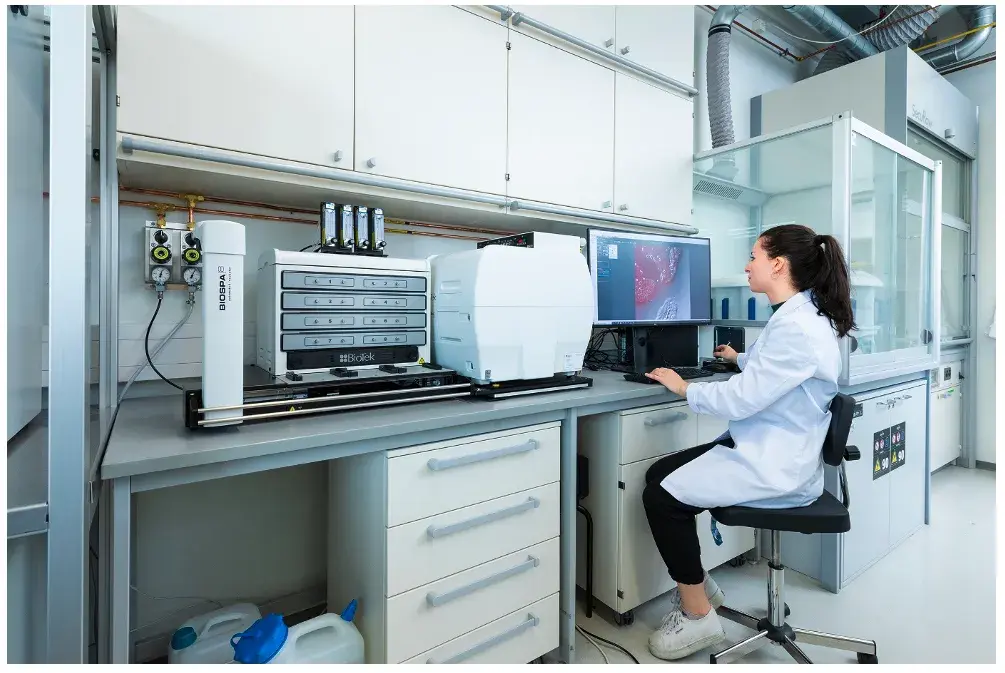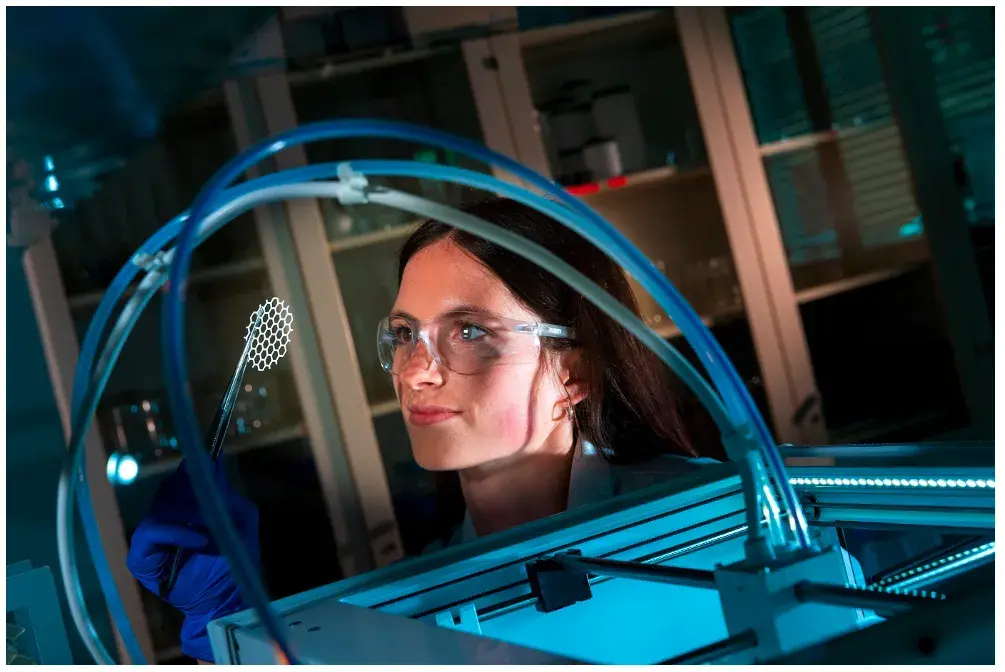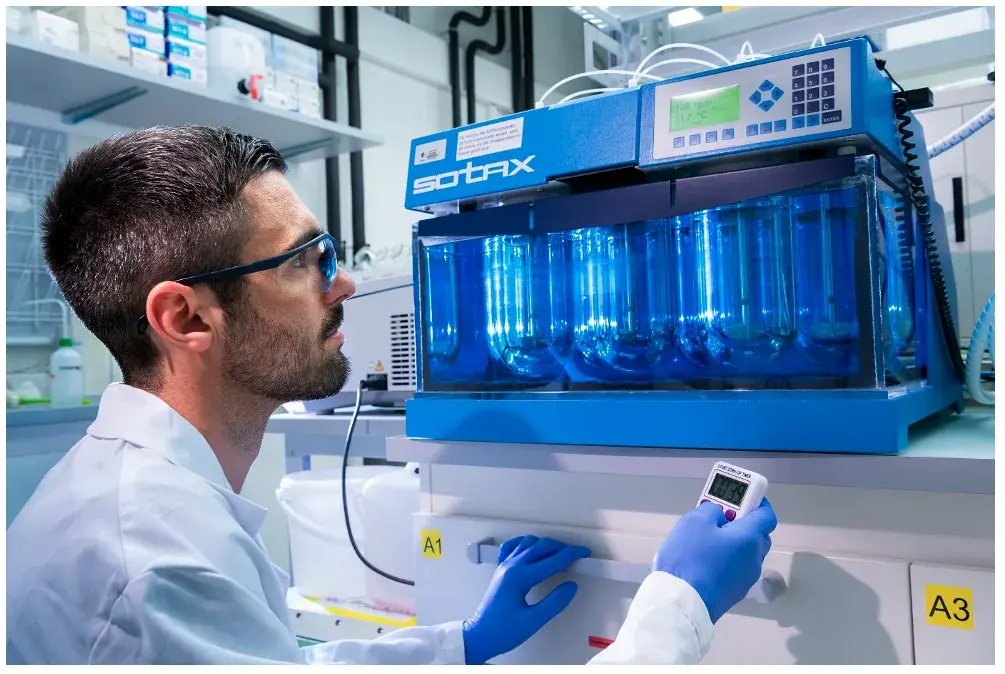Section Pharmaceutical Technology and Pharmacology

«Innovative pharmaceutical research and the training of young scientists are our passion.»
Dr. Steffi Lehmann
Head of Section Pharmaceutical Technology and Pharmacology
Within the research focus "Pharma Innovation" the "Pharmaceutical Technology and Pharmacology" group develops novel drug delivery systems to improve the application, pharmacokinetics and efficacy of active pharmaceutical ingredients. In particular, the Pharma team is interested in establishing therapeutic approaches enabling the targeted delivery of drugs to their site of action (diseased organ or target cells). There a therapeutic effect is to be triggered at the right time (targeted drug delivery). In addition, the group works on the pharmacological characterization of new drugs with respect to their pharmacokinetic (PK) and pharmacodynamic (PD) properties as well as their toxicity in 2D and 3D cell culture models and in zebrafish embryos. For this purpose, the group exploits different microscopic imaging techniques (live cell epifluorescence imaging, multiphoton and confocal microscopy). In the field of pharmaceutical technology, the team develops solid, semi-solid and liquid drug formulations and tests their quality (quality tests according to Ph.Eur).
About us
For the development of new, tissue-specific drug delivery systems, we use pharmaceutical nanoencapsulation systems such as extracellular vesicles (EVs) or mesoporous silica particles (MSPs), which package sensitive drugs, thereby protecting them, and can be directed to their target site by surface modification with address molecules. Together with the Organic Chemistry and Medicinal Chemistry Group, we have recently developed a platform to efficiently modify the surface of nanocarrier systems with ligands. In collaboration with the Center Functional Materials and Nanotechnology our group uses methods of pharmaceutical nanotechnology such as electrospinning to incorporate drugs into biodegradable polymer fibers, which can be employed to coat wound dressings or implant surfaces, enabling a sustained, local drug release.
Competencies and Research
Development of novel drug delivery systems

Nanoparticles such as lipid-based nanoparticles, for example liposomes or extracellular vesicles produced by cells, can be used as transport vehicles for drugs. They allow delicate drugs to be packaged a way that they are protected from premature degradation and improve their distribution within the organism. By chemically modifying their surface, such drug delivery systems can be directed to specific tissues or cells. Our team is investigating various strategies for chemically modifying the surface of drug-loaded nanoparticles to direct them to specific tissue types, where they can produce a therapeutic effect through local release of their cargo.
Development of drug formulations

Our laboratory develops pharmaceutical drug formulations. Thereby the main focus relies on the production of tablets as by far the most common galenic preparation. Tablets are produced by pressing equal volumes of crystalline, powdered or granulated drug-containing mixtures, including excipients, in appropriate tabletting machines. By selecting and combining suitable excipients, tablet properties such as disintegration time and drug release can be modified. Our group has the necessary expertise and is equipped for the
- Optimization of tablet formulations, screening of new tableting excipients
- Development of coated tablets
- Quality testing of tablets according to the European Pharmacopoeia
DMPK/PD studies in vitro and in vivo (2D, 3D cell culture models and zebrafish embryos)

We test novel drug candidates with regard to their pharmacodynamic (PD) and pharmacokinetic (PK) properties.
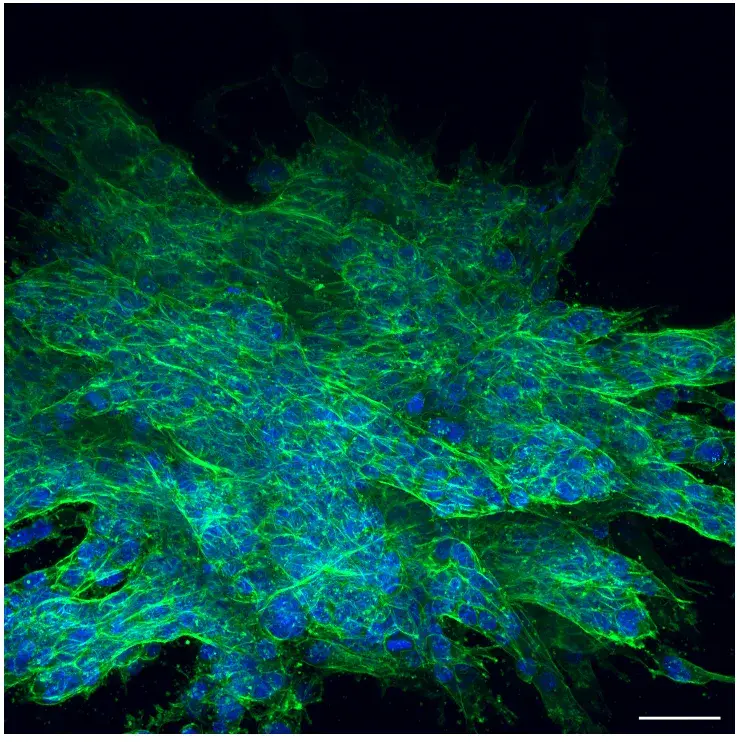
In addition to biochemical assays, we perform assays in 2D and 3D tissue culture models and zebrafish embryos. To elucidate the molecular and cellular mechanisms underlying the mode of action of new drugs, the lab has specialized in the use and is routinely applying microscopic imaging techniques (live epifluorescence imaging, confocal microscopy and multiphoton microscopy).
Timelapse microscopy for analyzing the cellular uptake of nanoparticles or cell migration
In vitro and in vivo toxicity assays
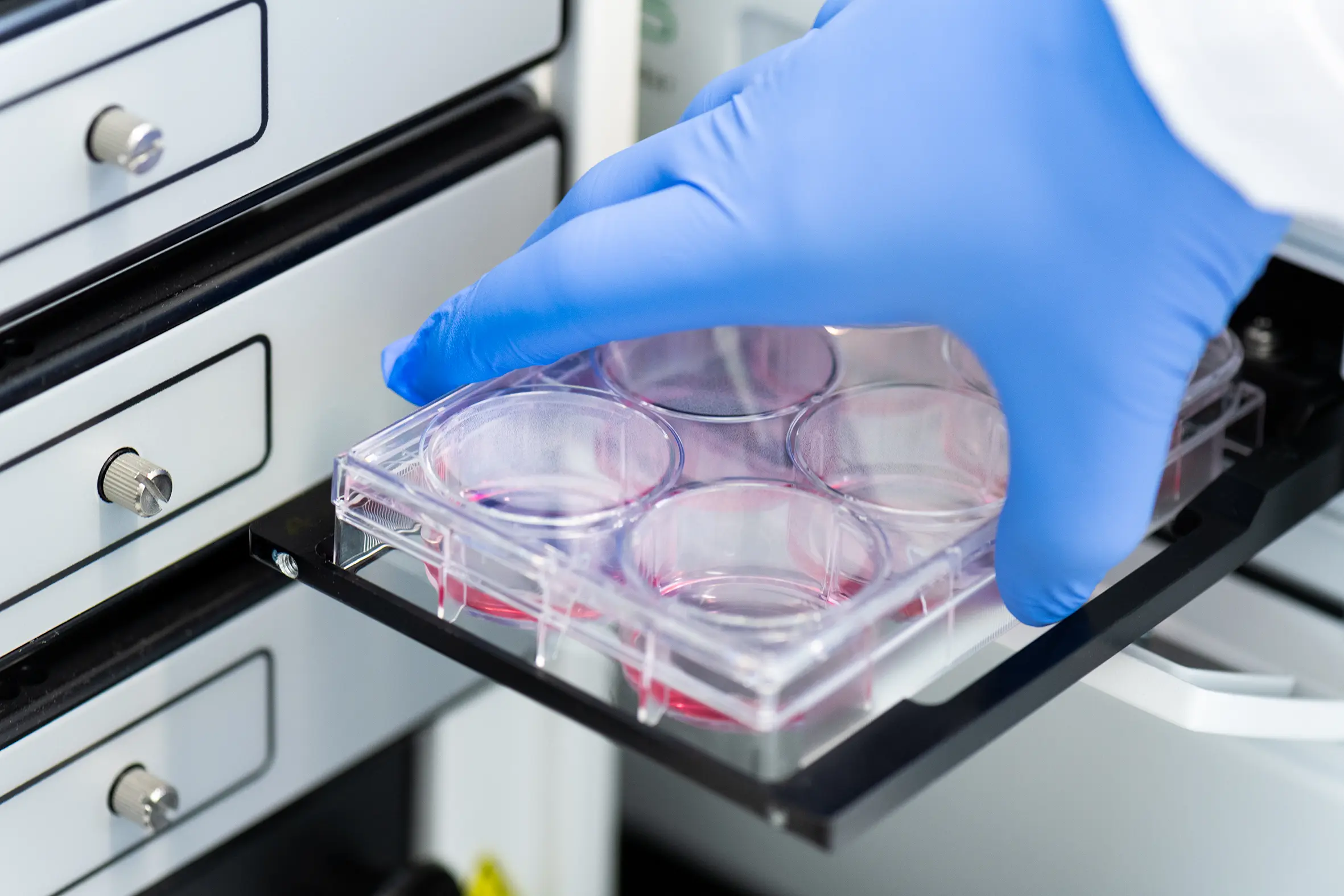
We perform toxicological profiling for new drug candidates. For this purpose, we carry out classical cytotoxicity experiments in cells as well as toxicological studies in zebrafish embryos.
Biopolymers

Polymers are used in many ways in pharmaceutical technology, for example for the development of new drug delivery systems, the coating of tablets or nanostructures. Polymers of natural origin as well as synthetic molecules are used. We are testing plant-derived biopolymers for various applications, for example for the production of electrospun nanostructures, which can be used in tissue engineering or for local drug delivery. As substitutes for plastic, biopolymers are also interesting for applications in pharmaceutical packaging or coatings.
Projects
-
Zebrafish larvae for drug screening
In this 3RCC-funded project, we aim to reduce the number of rodents employed for the screening of novel antimicrobials using a zebrafish larval model of bacterial infections. We will set up live microscopic imaging readouts to monitor bacterial spread in zebrafish larvae and will use the model to…
current, 05/2024 - 04/2027
-
Local brain retention for better brain cancer drugs
Glioblastoma is one of the most common primary brain neoplasms with very limited options for treatments and a low survival rate. For the last 40 years, no significant progress has been made for the therapy of this malignancy. The project aims at the further establishment of a technology and the…
current, 03/2024 - 06/2027
-
SpectralPad
SpectralPad offers an easy-to-use, accurate and cost-efficient way to diagnose and monitor yellow skin diseases for more than 1 billion patients world wide.
expired, 02/2024 - 07/2025
-
Targeting Gram-negative bacteria
In this project, novel small molecule antibiotics will be developed to target highly resistant Gram-negative bacteria. Gram-negative bacteria can cause various infections such as dermatitis, blood poisoning or pneumonia.
expired, 10/2023 - 08/2025
-
Novel phage derived antimicrobials
Novel, patentable bacteriophage-based precision antimicrobials are generated. To minimize the risk of failure at the pre-clinical stage, in vivo activity screening in zebrafish embryos is combined with process development, continuous evolution, and phage engineering during early stages of discovery.
expired, 08/2023 - 12/2025
-
Active modified surfaces for contained drug release
In this project, a protocol for immobilization of novel anti-fibrotic drug compounds within electrospun meshes of polymer fibres will be established. These meshes will allow for a local and sustained release of the incorporated drug molecules for the treatment of chronic wounds or to prevent implant…
expired, 09/2022 - 03/2023
-
Extracellular vesicles for targeted delivery of new antimicrobials
Infectious disease caused by bacteria constitutes a major threat to human health. Althoughantibiotics control bacterial infections, their efficacy is mitigated by the rise of antibioticresistance. Further challenging elimination of pathogenic bacteria, some species such asStaphylococcus aureus,…
expired, 04/2022 - 10/2023
-
Infused Drinking Water from Dropz
The aim is to introduce a patentable technology that allows Dropz to dissolve quickly and naturally, with minimum additives (clean label), and that creats differentation towards competitors.
expired, 03/2022 - 07/2022
-
Development of novel tablet formulations for the detection of pathogenic bacteria
expired, 10/2021 - 12/2022
-
Preventing capsular contracture by coating of silicone implants with bioglass
Due to its inertness, low toxicity and anti-adhesive properties, silicone is one of the most frequently used materials for medical implants. Amongst silicone materials typically transplanted to patients one finds silicone implants used for breast augmentations in plastic surgery. According to the…
expired, 01/2020 - 02/2021
-
Engineered bacteriophages for the control of E. coli O157
Bacteriophages (phages) represent a very promising alternative to antibiotics to combat infections caused by Shiga Toxin producing E. coli O157. In this research project, two different O157-specific bacteriophages will be genetically engineered to effectively control E. coli O157. In addition, a…
expired, 07/2019 - 06/2021
-
Integrated Bio-based Materials Value Chains (BIOMAT)
The aim of the project is to develop sustainable bio-based materials to replace the fossil based counterparts. On the one hand, biomaterials will be produced from side-stream products of agro-food industry. On the other hand, green technologies such as cultivation of microalgae will be used to…
expired, 06/2019 - 05/2022
-
Novel Antimicrobials for Life-Threatening Infections
Deaths due to antimicrobial resistance are alarmingly high, novel therapies are urgently needed. Here, novel antifungal compounds are developed against life-threatening infections. The compounds will be developed to preclinical proof-of-concept in a collaborative medicinal chemistry program.
expired, 04/2018 - 09/2019
-
Dynamic combinatorial chemistry in drug discovery
Das Ziel des Projekts ist die Etablierung einer Technik zur Auffindung neuartiger Wirkstoffmoleküle gegen biologische Zielenzyme durch die Anwendung und Erweiterung von dynamischen kombinatorischen Bibliotheken (DCL).
expired, 01/2018 - 12/2018
News
ZHAW Press Release (04/2023): Chemistry student awardes with the Max Lüthi prize for bachelor thesis
DIZH Fellowship 2022 / Steffi Lehmann: Set-up of a combined in silico/in cellulo screening platform to identify novel anti-fibrotic drugs
Team
-

ZHAW School of Life Sciences and Facility Management
Section for Pharmaceutical Technology and Pharmacology
Einsiedlerstrasse 31
8820 Wädenswil -

ZHAW School of Life Sciences and Facility Management
Section for Pharmaceutical Technology and Pharmacology
Einsiedlerstrasse 31
8820 Wädenswil -

ZHAW School of Life Sciences and Facility Management
Section for Pharmaceutical Technology and Pharmacology
Einsiedlerstrasse 31
8820 Wädenswil -

ZHAW School of Life Sciences and Facility Management
Section for Pharmaceutical Technology and Pharmacology
Einsiedlerstrasse 31
8820 Wädenswil -

ZHAW School of Life Sciences and Facility Management
Section for Pharmaceutical Technology and Pharmacology
-

ZHAW School of Life Sciences and Facility Management
Section for Pharmaceutical Technology and Pharmacology
Einsiedlerstrasse 31
8820 Wädenswil -

ZHAW School of Life Sciences and Facility Management
Section for Pharmaceutical Technology and Pharmacology
Einsiedlerstrasse 31
8820 Wädenswil
